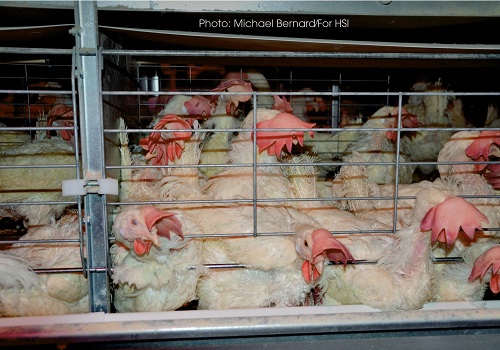The 2024 Canada Animal Welfare Scorecard evaluated animal welfare commitments and transparency across 40 leading Canadian food companies. Focusing on cage-free eggs, gestation-crate-free pork, and adherence to Better Chicken Commitment (BCC) standards, the report uncovers serious gaps in transparency, industry-wide “humanewashing,” and persistent animal welfare issues. Here’s a breakdown of the most troubling findings.
1. Misleading Industry Claims and “Humanewashing” Tactics
The food industry’s “humanewashing” tactics are widespread, and several major organizations, including Chicken Farmers of Canada and Burnbrae Farms, have worked to mislead consumers. Associations use terms like “family farms” to suggest humane, small-scale practices, while companies like Burnbrae Farms market their “Nestlaid” eggs as cage-free, despite being produced in cage systems. This misinformation persists in the animal welfare sections of corporate-responsibility reports, misleading consumers and obscuring actual welfare practices.
2. The Crisis of “Frankenchickens” in Poultry Production
The Canadian poultry industry’s use of ultrafast-growing birds, often termed “Frankenchickens,” remains a primary welfare issue. These birds are bred to grow four times faster than chickens in the 1950s, resulting in painful health problems and limiting their ability to move or access food and water. Although companies have pledged to stop using these breeds by 2026, few have shown significant action on this front. Major Canadian poultry producers continue to use these breeds, creating severe welfare implications.
3. Continued Use of Gestation Crates for Pigs
Gestation crates remain the norm across Canadian pork production, confining mother pigs in cramped stalls that prevent them from turning around. Some progress is evident, with companies like Costco and Starbucks Canada reporting steps toward group housing. However, Walmart Canada and Federated Co-operatives have not published policies or progress. While the industry timeline for complete phase-out stretches to 2029, these companies have yet to implement meaningful welfare improvements, prolonging extreme confinement for Canada’s 1.2 million breeding sows.
4. Lack of Transparency in Major Retailers and Foodservice Providers
Walmart Canada, Calgary Co-op, and Federated Co-operatives have demonstrated minimal transparency, failing to publish updates or roadmaps on their animal welfare commitments. Walmart Canada is the only top-five retailer in Canada not reporting any progress on welfare practices, despite publishing incremental updates in the U.S. Meanwhile, Calgary Co-op still lacks any published policies or progress toward ending confinement for hens and pigs, despite its members’ vote to support humane conditions over a decade ago.
5. Ongoing Consumer Misinformation and “Humanewashing”
A significant challenge for Canadian consumers is discerning which brands genuinely uphold higher animal welfare standards. Companies like Burnbrae Farms rely on labels like “Nestlaid” to give the impression of cage-free conditions, confusing nearly half of surveyed consumers into believing these eggs are from open barns. This “humanewashing” misleads customers, while industry groups spend millions to influence public opinion rather than improve actual practices.
6. Slow Progress in the Shift to Cage-Free Eggs
Despite growing opposition to cage confinement from Canadian consumers, the Canadian egg industry continues to invest in “enriched” cage systems that offer only minor improvements over conventional battery cages. Companies like Metro and Sobeys committed to sourcing cage-free eggs but report slow progress across their supply chains, while Calgary Co-op has yet to report any steps forward. Globally, over 2,600 companies have committed to eliminating cages, but Canada falls behind due to its reliance on slightly modified cage systems.
7. Inconsistent Reporting on Chicken Welfare Standards
Canada’s poultry industry has shown progress on controlled-atmosphere stunning (CAS) and stocking density but largely overlooks higher welfare standards like BCC-aligned breeds and on-farm enrichments. While companies such as Whole Foods report meeting some of these standards, others have been slow to transition to higher-welfare breeds. With countries like the U.S. and U.K. leading the way on welfare improvements, Canada risks falling further behind without a national broiler welfare policy.
8. Investor and Consumer Demand Outpacing Industry Action
As investors increasingly consider animal welfare a key ESG factor, poor practices present reputational and regulatory risks for companies. Yet, brands like Federated Co-operatives and Couche-Tard (Circle K) lag in integrating robust welfare policies into their ESG strategies. With transparency becoming an expectation in ESG reporting, companies that avoid clear welfare commitments face potential setbacks as investors prioritize humane practices.
Moving Forward: Accountability and Clear Roadmaps Required
Companies need transparent roadmaps, annual goals, and consistent reporting to keep pace with rising consumer and investor expectations. Brands such as A&W Canada, Panago Pizza, and Aramark have set strong examples, publishing BCC-compliant policies and reporting progress, proving tangible progress is achievable. However, for others, a significant gap remains between public promises and the welfare practices in their supply chains.
Mercy For Animals, is highly recognized as one of the world’s most effective charities working to end the exploitation of animals for food. Mercy For Animals’ fourth annual Canada Animal Welfare Scorecard, launched Wednesday, October 30. For more information, read the full report.

